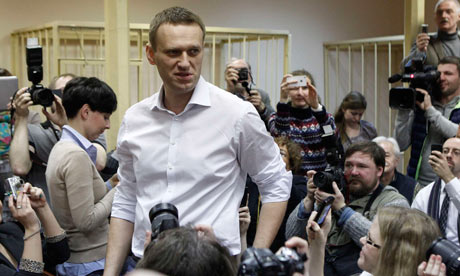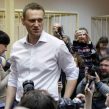
The Issue of Neutrality in Putin’s Russia
Publication: Eurasia Daily Monitor Volume: 10 Issue: 124
By:

Barely noticed in the United States and Europe, where security analysts pile their files on Egypt on top of dossiers on Brazil and Turkey, the political crisis in Russia reached a new phase last week as the Kremlin intensified its persecution of the opposition. The main instrument of these repressions is the criminal investigation, and the main focus of the campaign is the court case against fierce anti-corruption blogger and fast-rising politician Alexei Navalny, who stands accused of organizing an embezzlement scheme in provincial Kirov (Novaya Gazeta, July 5). Dismissing the objections of Navalny’s legal defense team, the judge brought the proceeding to a close, thus giving the defendant and his associate Petr Ofitserov the opportunity to address a far wider audience than just the crowded court room with their last words. Ofitserov refused to plea for leniency, calling to mind the trial ten years ago of Mikhail Khodorkovsky, who recently celebrated his 50th birthday behind bars (Forbes.ru, July 2). Navalny went even further by asserting that the “disgusting feudal regime” in Russia must be destroyed and that nobody has the “right to neutrality” in this struggle (https://newtimes.ru/articles/detail/69047/).
His words resonated in Moscow where 57 percent of respondents (compared with 44 percent throughout all of Russia) are of the opinion that the authorities only want to silence Navalny, while he stubbornly continues his campaign in the mayoral elections (Gazeta.ru, July 5). Meanwhile, the court case in Moscow against protesters accused of provoking clashes with police in May 2012 continues to drag toward a pre-determined verdict (Moskovsky Komsomolets, July 5). Marking a serious escalation in the government’s attacks on the “malcontents” was the arrest of Evgeny Urlashov, the mayor of Yaroslavl, who won elections last year against an official candidate and continued to defy the Kremlin’s control over regional political processes (https://lenta.ru/articles/2013/07/03/urlashov/). The party of power, United Russia, may suffer a severe loss of support in Yaroslavl because of that crudely fabricated bribery case, but it was deemed necessary to make an example out of Urlashov—no political challenges would be tolerated (Forbes.ru, July 4).
Yet another target of pressure is the Russian Academy of Sciences, which has experienced a protracted degradation but last May elected physicist Vladimir Fortov as its new president with a mandate for deep reforms—against the expressed preferences of the Kremlin (https://www.ng.ru/politics/2013-07-04/1_academy.html). Without any warning, the government presented to the State Duma draft legislation that would essentially eliminate the academic independence of the Academy and place it under strict bureaucratic control (https://www.vedomosti.ru/opinion/news/13762731/korporaciya-rosnauka). Emotional protestations from the shocked academicians have brought only minor revisions in the Duma approval of the legislation. At the same time, the most recent crash of a Proton-M rocket carrying three GLONASS satellites seconds after launch from Baikonur Cosmodrome sadly highlighted the decline in Russian scientific research (Kommersant, July 3). The advanced space program and a strong foundation for science advancement used to be key parts of the Soviet claim for the country’s “great power” status. But in Putin’s Russia, both are redundant as the quasi-imperial project has degenerated to a PR exercise (Gazeta.ru, July 5).
For Putin, the Academy of Sciences is merely a pasture for the “creative classes” that harbor intentions to sabotage his policy of consolidating Russia around his stable leadership. Yet, he believes the creative classes have no stomach to insist on an alternative (which Navalny tries to represent) and so they should be subdued into submission. The Kremlin policy planners assume that the street protests in Moscow that gained such momentum in early 2012 have lost their drive. Therefore, the authorities trust extralegal arrests and “show trials” will not provoke any new rallies but will bring back the “fear factor” and remind the dissidents that they have a lot to lose. The urban middle classes in Russia are indeed largely comprised of bureaucrats, employed in the vast state apparatus, and services providers, like scientists, who depend upon funding from the state budget and so are vulnerable to the state’s repercussions (Gazeta.ru, July 4). The depth of discontent among these improbable rebels is, nevertheless, seriously underestimated by the self-serving court of wise men. Economic squeeze is yet to become a driver of unrest, but the disappointment in Putin’s leadership is giving way to disgust in the pretentious righteousness of the corrupt security and enforcement services (siloviki).
Such perceptions tend to trickle up because the intellectuals, despised as they are by the corrupt authorities, remain the producers of powerful images and public discourse, with which the state propaganda is unable to compete. The angst among the elites is sharpened by the preoccupation of Putin’s subordinates on regime survival at the expense of executing the crucially important task of legitimizing property rights and ensuring the safety of the fortunes accumulated by the entrepreneurial bureaucrats and loyal oligarchs (Grani.ru, July 1). These stakeholders in the Russian “normalcy” are fast turning cosmopolitan as their wealth goes global, and so are becoming interested in the evolution of the regime toward softer and “enlightened” forms of authoritarianism. Whereas, Putin is determinedly moving in the opposite direction. This hidden conflict turns Navalny’s point on the disappearing “right to neutrality” into a challenge not only for the Russian “modernizers” but also for Russia’s Western partners.
The US, Germany and other European states, indeed, have vested interests in Russia’s stability. However, this commitment is not synonymous with, and is increasingly divorced from, the stability of Putin’s regime. Western policies of engagement and initiatives on “reset” reflect this fundamental interest but ignore this divorce as Putin skillfully converts every high-level get-together, like the forthcoming G20 summit, into a demonstration of the eagerness of Western leaders to accept him as the legitimate and irreplaceable ruler of Russia. It is his “inflexible” position against any intervention in the Syrian civil war that invites much lamentation, while in fact it is a natural continuation of his repressive domestic policy. He certainly cuts a figure too important to ignore, but his loyal lieutenants are looking for signals confirming his diminishing adequacy in their peers’ opinion.




